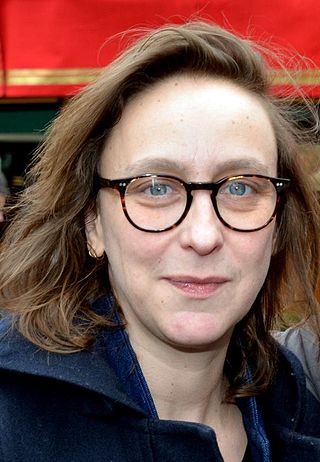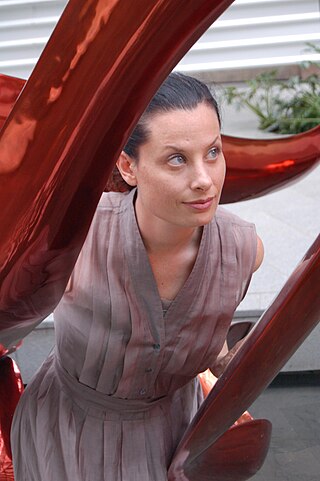Related Research Articles

Isabelle Anne Madeleine Huppert is a French actress. Known for her portrayals of cold, austere women devoid of morality, she is considered one of the greatest actresses of her generation. With 16 nominations and two wins, Huppert is the most nominated actress at the César Awards. She is also the recipient of several accolades, including five Lumières Awards, a BAFTA Award, three European Film Awards, two Berlin International Film Festival, three Cannes Film Festival and Venice Film Festival honors, a Golden Globe Award, and an Academy Award nomination. In 2020, The New York Times ranked her second on its list of the greatest actors of the 21st century.

Agnès Varda was a Belgian-born film director, screenwriter, photographer, and artist with French and Greek origins.

Claire Denis is a French film director and screenwriter. Her feature film Beau Travail (1999) has been called one of the greatest films of the 1990s and of all time. Other acclaimed works include Trouble Every Day (2001), 35 Shots of Rum (2008), White Material (2009), High Life (2018) and Both Sides of the Blade (2022), the last of which won her the Silver Bear for Best Director at the Berlin International Film Festival. For her film Stars at Noon (2022), Denis competed for the Palme d'Or at the 2022 Cannes Film Festival. She won the Grand Prix, sharing the award with Lukas Dhont's film Close.

Euzhan Palcy is a French film director, screenwriter, and producer. Her films are known to explore themes of race, gender, and politics, with an emphasis on the perpetuated effects of colonialism. Palcy's first feature film Sugar Cane Alley received numerous awards, including the César Award for Best First Feature Film. With A Dry White Season (1989), she became the first black female director to have a film produced by a major Hollywood studio, MGM.

Cinema of Africa covers both the history and present of the making or screening of films on the African continent, and also refers to the persons involved in this form of audiovisual culture. It dates back to the early 20th century, when film reels were the primary cinematic technology in use. During the colonial era, African life was shown only by the work of white, colonial, Western filmmakers, who depicted Africans in a negative fashion, as exotic "others". As there are more than 50 countries with audiovisual traditions, there is no one single 'African cinema'. Both historically and culturally, there are major regional differences between North African and sub-Saharan cinemas, and between the cinemas of different countries.

Calypso Rose or Linda McCartha Monica Sandy-Lewis is a Trinidadian calypsonian. She started writing songs at the age of 13; over the years, she has composed more than 1000 songs and recorded more than 20 albums. Considered the "mother of calypso", Rose was the first female calypso star and her lyrics frequently address social issues like racism and sexism. Her influence over the calypso music genre forced the renaming of the Calypso King competition to the Calypso Monarch instead. In addition to writing songs about social issues, Rose is also an activist and was given the title of UNICEF Goodwill Ambassador for former child soldiers along with performing at numerous events for social change. She has received every award available to living artists in the Caribbean.

Thérèse Sita-Bella, born Thérèse Bella Mbida, was a Cameroonian film director who became the first woman filmmaker of Africa and Cameroon.

Annemarie Jacir is a Palestinian filmmaker, writer, and producer.

Simon Njami is a writer and an independent curator, lecturer, art critic and essayist.
Kaveri Kaul, formerly known as Kavery Dutta, is a Kolkata-born, American filmmaker and founder of the production company, Riverfilms. Her directing and producing credits include Back Walking Forward, Long Way from Home, Cuban Canvas, One Hand Don’t Clap, and First Look.
Merata Mita was a New Zealand filmmaker, producer, and writer, and a key figure in the growth of the Māori screen industry.

Céline Sciamma is a French screenwriter and film director. She wrote and directed Water Lilies (2007), Tomboy (2011), Girlhood (2014), Portrait of a Lady on Fire (2019), and Petite Maman (2021). Sciamma has received various awards and nominations for her films, including two BAFTA nominations for Best Film Not in the English Language.

The Queen of Trinidad is a studio album from Tobagonian Calypso singer/songwriter, Calypso Rose, released by Maturity Productions/VPAL on June 19, 2012.

Akosua Adoma Owusu is a Ghanaian-American filmmaker and producer. Her films explore the colliding identities of black immigrants in America through multiple forms ranging from cinematic essays to experimental narratives to reconstructed Black popular media. Interpreting the notion of "double consciousness," coined by sociologist and civil rights activist W. E. B. Du Bois, Owusu aims to create a third cinematic space or consciousness. In her work, feminism, queerness, and African identities interact in African, white American, and black American cultural spaces.
Pascale Ferran is a French film director and screenwriter. In 2007, her film Lady Chatterley won five César Awards including Best Film, Best Cinematography and Best Adaptation. Her 2014 film Bird People was selected to compete in the Un Certain Regard section at the 2014 Cannes Film Festival. Ferran also wrote the screenplay for The Red Turtle, an animated film by Michael Dudok de Wit, that competed in the Hawaii International Film Festival on 12 November 2016.

Joana Hadjithomas and Khalil Joreige are Lebanese filmmakers and artists. Their work includes feature and documentary films, video and photographic installations, sculpture, performance lectures and texts.

Mara Gercik Haseltine is an American artist and environmental activist who has shown and worked internationally. She collaborates with scientists and engineers to create her work, which focuses on the link between human's shared cultural and biological evolution.
Pascale Lamche, is a French–South African filmmaker. She is known as the director of several critically acclaimed film including Stalingrad, Black Diamond, Pakistan Zindabad, French Beauty, Accused #1: Nelson Mandela, Sophiatown and Winnie. Apart from filmmaking, she is also a producer, writer and cinematographer.

Amina Zoubir is a contemporary artist, filmmaker and performer from Algiers, Algeria. She is known as a feminist performer through video-actions entitled Take your place, which she directed in 2012 during the 50th anniversary of Algerian independence, aiming to question gender issues and conditions of women in Algerian society. She has worked with different art mediums such as sculpture, drawing, installation art, performance and video art. Her work relates to notions of body language in specific spaces of North Africa territories.

Rosine Mbakam is a Cameroonian film director based in Belgium. She has directed many short films and full-length documentaries. Les deux visages d'une femme Bamiléké/The Two Faces of a Bamiléké Woman (2016) and Chez Jolie Coiffure (2018) won a number of international prizes. Les prières de Delphine/Delphine’s Prayers (2021) gained international attention, including reviews in The New York Times, The New Yorker, LA Times, Variety, and NPR. With Mambar Pierrette, Mbakam made her feature film debut in 2023.
References
- 1 2 "Pascale Obolo". Institute of African American Affairs. Retrieved 13 November 2017.
- ↑ Barlet, Olivier (1 August 2016). Contemporary African Cinema. MSU Press. p. 337. ISBN 978-1-62895-270-4.
- ↑ "Parcours: Pascale Obolo, reine camerounaise de l'art contemporain". Jeune Afrique (in French). Retrieved 13 November 2017.
- ↑ "Pascale Obolo: the Cameroonian artist promoting a new kind of cultural criticism". True Africa. 20 September 2015. Retrieved 13 November 2017.